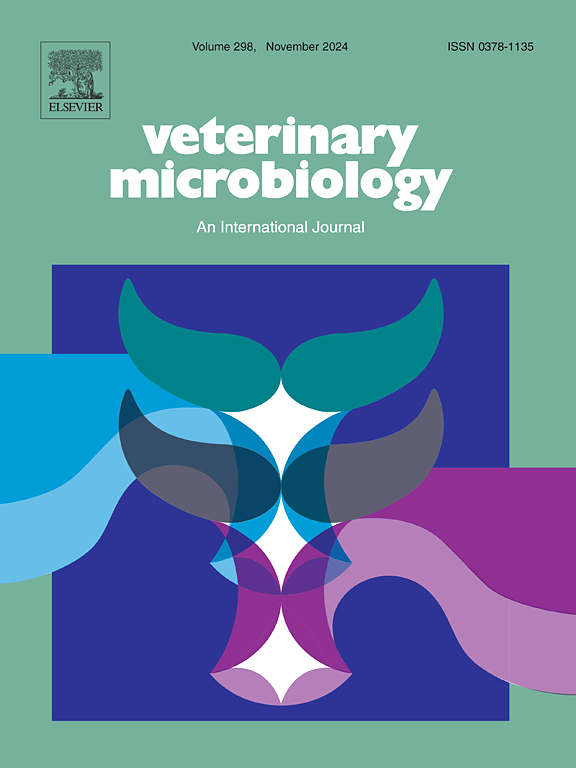Development of a recombinant Lactobacillus plantarum oral vaccine expressing VP2 protein for preventing feline panleukopenia virus
IF 2.4
2区 农林科学
Q3 MICROBIOLOGY
引用次数: 0
Abstract
Feline panleukopenia virus (FPV) represents a significant health threat to the kittens. While traditional vaccines administered via subcutaneous or intramuscular injection are effective, they can induce stress and adverse reactions. Moreover, unvaccinated kittens visiting veterinary clinics risk exposure to FPV, increasing their susceptibility to infection. Therefore, there is an urgent need for a safer, more gentle vaccination method with streamlined administration. In this study, we developed a recombinant L. plantarum NC8/VP2 expressing the VP2 protein of the prevalent Chinese FPV strain, FPV-251. Our results show that L. plantarum NC8/VP2 effectively colonizes the feline intestinal tract and induces high levels of neutralizing antibodies through oral administration. Kittens exhibited significant protection against FPV-251 infection and associated illnesses or fatalities after 30 days of continuous dosing. These results highlight the potential of recombinant L. plantarum NC8/VP2 as a novel oral vaccine for FPV, presenting a promising approach for disease prevention in domestic cats.
开发表达 VP2 蛋白的重组植物乳杆菌口服疫苗以预防猫泛白细胞减少症病毒
猫泛白细胞减少症病毒 (FPV) 对幼猫的健康构成严重威胁。虽然通过皮下注射或肌肉注射的传统疫苗很有效,但它们可能会引起应激反应和不良反应。此外,未接种疫苗的幼猫到兽医诊所就诊时有可能接触到 FPV,从而增加感染的几率。因此,我们迫切需要一种更安全、更温和、更简便的疫苗接种方法。在本研究中,我们开发了表达中国流行的 FPV 株 FPV-251 的 VP2 蛋白的重组植物乳杆菌 NC8/VP2。结果表明,植物乳杆菌 NC8/VP2 能有效定植于猫肠道,并通过口服诱导高水平的中和抗体。小猫在连续服药 30 天后,对 FPV-251 感染和相关疾病或死亡表现出明显的保护作用。这些结果凸显了重组植物乳杆菌 NC8/VP2 作为 FPV 新型口服疫苗的潜力,为家猫疾病预防提供了一种前景广阔的方法。
本文章由计算机程序翻译,如有差异,请以英文原文为准。
求助全文
约1分钟内获得全文
求助全文
来源期刊

Veterinary microbiology
农林科学-兽医学
CiteScore
5.90
自引率
6.10%
发文量
221
审稿时长
52 days
期刊介绍:
Veterinary Microbiology is concerned with microbial (bacterial, fungal, viral) diseases of domesticated vertebrate animals (livestock, companion animals, fur-bearing animals, game, poultry, fish) that supply food, other useful products or companionship. In addition, Microbial diseases of wild animals living in captivity, or as members of the feral fauna will also be considered if the infections are of interest because of their interrelation with humans (zoonoses) and/or domestic animals. Studies of antimicrobial resistance are also included, provided that the results represent a substantial advance in knowledge. Authors are strongly encouraged to read - prior to submission - the Editorials (''Scope or cope'' and ''Scope or cope II'') published previously in the journal. The Editors reserve the right to suggest submission to another journal for those papers which they feel would be more appropriate for consideration by that journal.
Original research papers of high quality and novelty on aspects of control, host response, molecular biology, pathogenesis, prevention, and treatment of microbial diseases of animals are published. Papers dealing primarily with immunology, epidemiology, molecular biology and antiviral or microbial agents will only be considered if they demonstrate a clear impact on a disease. Papers focusing solely on diagnostic techniques (such as another PCR protocol or ELISA) will not be published - focus should be on a microorganism and not on a particular technique. Papers only reporting microbial sequences, transcriptomics data, or proteomics data will not be considered unless the results represent a substantial advance in knowledge.
Drug trial papers will be considered if they have general application or significance. Papers on the identification of microorganisms will also be considered, but detailed taxonomic studies do not fall within the scope of the journal. Case reports will not be published, unless they have general application or contain novel aspects. Papers of geographically limited interest, which repeat what had been established elsewhere will not be considered. The readership of the journal is global.
 求助内容:
求助内容: 应助结果提醒方式:
应助结果提醒方式:


